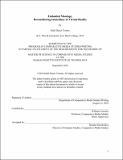Embodied montage : reconsidering immediacy in virtual reality
Author(s)
Tortum, Halil Deniz
DownloadFull printable version (36.15Mb)
Alternative title
Reconsidering immediacy in virtual reality
Other Contributors
Massachusetts Institute of Technology. Department of Comparative Media Studies.
Advisor
William Uricchio.
Terms of use
Metadata
Show full item recordAbstract
Virtual reality, as the name implies, is implicitly evaluated by its ability to reproduce or imitate aspects of reality, particularly in ways that convince users that they are physically present in the virtual space. This approach to the medium, a form of immediacy, effaces the material reality of the medium and can obscure the ways through which a medium can offer new forms of knowledge. Virtual reality's realism is a construct, and by acknowledging this, creators can push the medium to more experimental and novel ends. The framework of embodied montage proposed in this thesis seeks to provide an expressive vocabulary and techniques for creating virtual reality work that accounts for the material aspects of the medium. Drawing on theoretical research from film and media theory, analyzing existing virtual reality work, and discussing the process of creating an original virtual reality work, I analyze the 3D capture and interaction design process. I offer the term machine vision perspective to describe the process of experiencing such images through virtual reality systems. This process provides a ground to experiment with embodied modes of thinking that are not possible with the human body situated in the real world. This makes embodied montage, a novel framework proposed by this thesis, possible. Embodied montage is the decoupling and recoupling of action and perception in virtual reality experiences in order to generate new meanings, similar to montage in film. Drawing on film theory, media history and cognitive science, this framework creates a territory for creative expression that challenges embodied cognitive structures and could effectively use the medium in ways that are distinguished from other media forms.
Description
Thesis: S.M. in Comparative Media Studies, Massachusetts Institute of Technology, Department of Humanities, 2016. This electronic version was submitted by the student author. The certified thesis is available in the Institute Archives and Special Collections. Cataloged from student-submitted PDF version of thesis. Includes bibliographical references (pages 83-86).
Date issued
2016Department
Massachusetts Institute of Technology. Program in Comparative Media Studies/WritingPublisher
Massachusetts Institute of Technology
Keywords
Humanities., Comparative Media Studies.